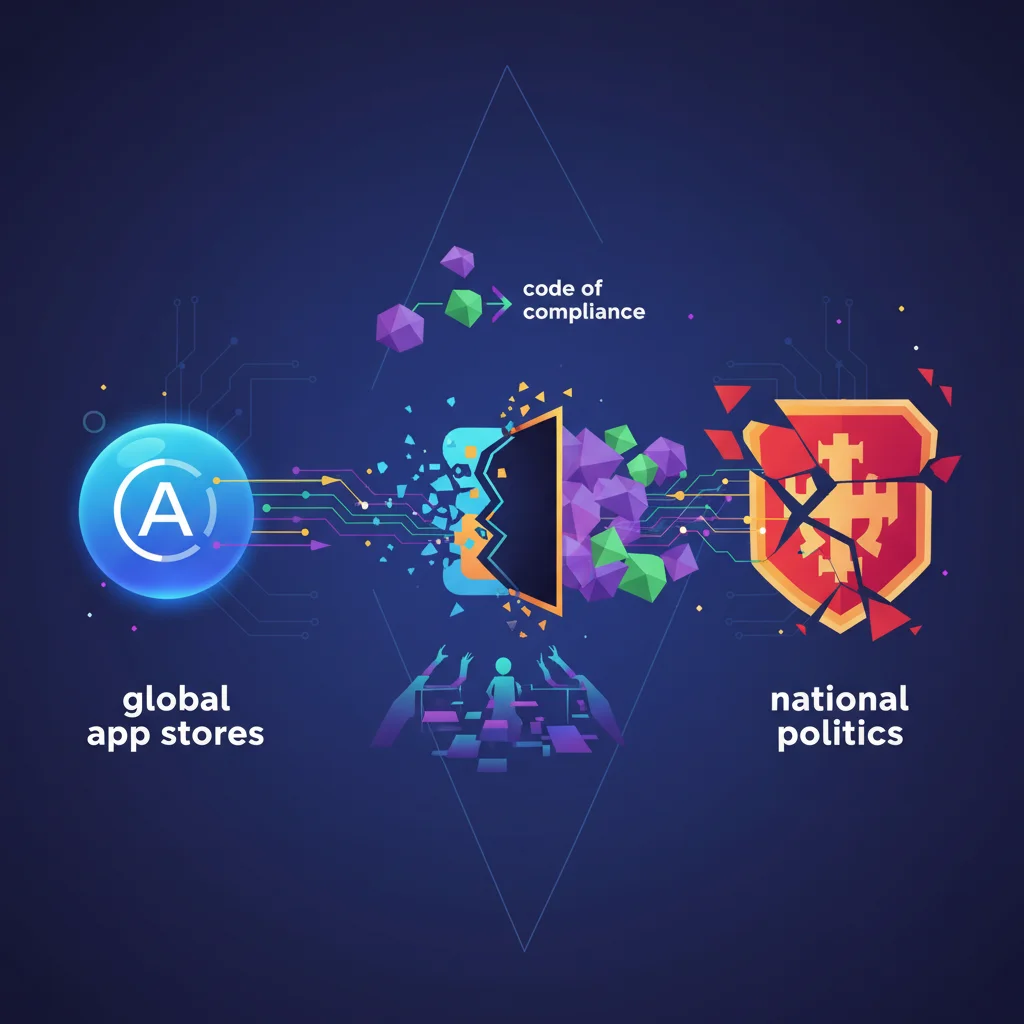
The Code of Compliance: When Global App Stores and National Politics Collide
In the digital age, a simple tap on an icon can connect you to a world of community, commerce, and conversation. But what happens when that portal vanishes overnight? For millions in China, this question became a stark reality when Blued and Finka, two of the country’s most popular gay dating platforms, were abruptly removed from Apple’s App Store. This move wasn’t a technical glitch or a business decision by the developers; it was a quiet, yet resonant, act of digital censorship that sends shockwaves far beyond the LGBTQ+ community, raising critical questions for developers, startups, and the global tech industry at large.
The disappearance of these apps is more than an isolated incident. It’s a potent case study in the complex, high-stakes dance between global technology giants and sovereign nations. It highlights the growing tension between the promise of a borderless digital world and the reality of increasingly fragmented, politically-controlled digital ecosystems. For any tech professional, from a solo developer with a groundbreaking idea to a C-suite executive at a multinational SaaS company, understanding the undercurrents of this event is no longer optional—it’s essential for survival and innovation in the 21st century.
From Unicorn Startup to Digital Ghost: The Story of Blued
To grasp the significance of this removal, one must understand that Blued wasn’t just another dating app. Founded in 2012 by a former policeman, Ma Baoli (Geng Le), Blued grew into a global behemoth. At its peak, it was a celebrated tech startup, boasting over 60 million registered users worldwide and becoming a comprehensive platform for the gay community, offering dating, live streaming, and health services.
Its parent company, BlueCity Holdings, achieved a milestone by listing on the NASDAQ in 2020, a testament to its market power and a moment of pride for many in China’s tech scene. However, the triumph was short-lived. The company was taken private and delisted just two years later, a move many analysts see as a reaction to the tightening regulatory environment in China. The app’s subsequent removal from the App Store is the final chapter in a cautionary tale about the precariousness of building digital communities that fall outside state-sanctioned norms.
Michael Burry's Big Short 2.0? Why The Legendary Investor is Betting Against AI Darling Palantir
The Great Firewall’s Gatekeeper: Apple’s Role in a Regulated Market
When an app vanishes from the App Store in China, the decision-making process is often opaque. However, it’s part of a well-established pattern. Global tech companies, particularly Apple, must navigate a labyrinth of local laws and regulations to maintain access to the lucrative Chinese market. According to Apple’s own transparency reports, the company fields thousands of government requests for app removals, and it complies with the vast majority of them in China.
This creates an ethical and operational tightrope for companies. On one hand, they argue for a philosophy of engagement, suggesting that it’s better to be present in a market, even with compromises, than to withdraw entirely. On the other, they become de facto enforcers of state censorship. The technical process of removal is simple—a flick of a switch in the App Store’s backend software. The geopolitical and ethical implications, however, are infinitely complex.
For developers, this means the platform they rely on for distribution can also become their single point of failure. A piece of software that is perfectly legal and celebrated in one country can be deemed illicit in another, and the global gatekeeper is often obligated to enforce the local verdict. This reality fundamentally challenges the “build once, deploy anywhere” dream of many modern SaaS and mobile application developers.
AI and Automation: The Unseen Engines of Digital Control
How is this level of control maintained at such a massive scale? The answer lies in sophisticated automation, powered by artificial intelligence and machine learning. Both state censors and the tech platforms themselves employ advanced AI algorithms to scan content, user behavior, and even code for keywords, images, and patterns deemed “problematic.”
These systems are a double-edged sword of innovation:
- For Platforms: AI-driven moderation tools are essential for identifying and removing harmful content like hate speech or illegal activities, creating safer online spaces.
- For States: The same technology can be repurposed to enforce political ideology, suppress dissent, and erase entire communities from the digital public square.
The programming behind these moderation algorithms is incredibly complex. They must be trained on vast datasets to understand context, nuance, and slang. However, when the rules are dictated by state authorities, the AI becomes a tool not for community safety, but for social control. It can flag discussions, identify organizers, and automatically suppress content that deviates from government directives. This raises profound cybersecurity concerns, as user data processed by these systems can be used to target individuals offline.
A Pattern of Disappearance
The removal of Blued and Finka is not an anomaly but part of a broader, accelerating trend. The Chinese government has been systematically tightening its control over the internet and social discourse under the banner of “cleaning up” the web and promoting “socialist core values.” This has impacted everything from online gaming to educational technology and, increasingly, LGBTQ+ content.
Here is a brief timeline of similar actions that illustrate the pattern:
| Year | Event | Impact |
|---|---|---|
| 2017 | New regulations require VPN providers to be licensed by the government. | Apple removes dozens of major VPN apps from its China App Store, restricting tools used to bypass the Great Firewall. (Source) |
| 2018 | Sina Weibo, a major social media platform, announces a 3-month “cleanup” of content, initially including homosexual themes. | After a massive online backlash with the hashtag #IamGay, the platform reverses its decision on gay content but proceeds with cleaning up violent and pornographic material. (Source) |
| 2021 | Social media accounts of university LGBTQ+ groups are deleted from platforms like WeChat and Weibo. | Dozens of student-run advocacy and support groups are silenced, severing key community networks for young people. |
| 2023-2024 | Blued and Finka are removed from the App Store in China. | Two of the largest digital gathering places for the gay community are made inaccessible to new users on iOS, fragmenting the community and pushing it further underground. |
The AI Gold Rush Hits a Speed Bump: Is the Tech Bubble About to Burst?
What This Means for the Future of Global Tech
For the diverse audience in the tech world, the implications of this event are far-reaching and demand careful consideration.
For Developers & Programmers: Your code exists within a political context. Building features for community organizing, anonymous communication, or encrypted messaging can place your app in the crosshairs of regulators. Developing for a global audience now requires a modular approach, where features can be enabled or disabled based on regional compliance requirements. This adds a significant layer of complexity to the programming and deployment pipeline.
For Startups & Entrepreneurs: Market expansion strategies, particularly into China, must include a thorough geopolitical risk assessment. The allure of a billion-plus user market comes with the risk of sudden regulatory shifts that can render your business model obsolete overnight. Relying on a single point of distribution like the App Store is a vulnerability. Exploring alternative distribution methods, where possible, and having contingency plans are crucial.
For Cloud & SaaS Providers: Data sovereignty is a non-negotiable reality. To operate in many countries, including China, you must host user data on local cloud infrastructure. This has massive implications for architecture, security, and cost. It also means that user data is subject to local laws and government access requests, creating a significant cybersecurity and privacy challenge.
Australia's Teen Social Media Ban: A Tech Minefield or a Cybersecurity Gold Rush?
Conclusion: Navigating the Digital Crossroads
The removal of Blued and Finka from China’s App Store is a microcosm of the biggest challenge facing the 21st-century technology landscape: the collision of global platforms with national interests. It demonstrates that the lines of code we write and the digital platforms we build do not exist in a vacuum. They are deeply embedded in the social and political fabric of the societies they serve.
This event serves as a powerful reminder that for all the talk of a decentralized Web3 future, the digital world remains highly centralized and susceptible to the pressures of state power. For the global tech community, the path forward requires more than just technical innovation. It demands a deeper understanding of geopolitics, a commitment to ethical principles, and a resilient strategy for navigating a world where the rules of the digital game can change without warning.


